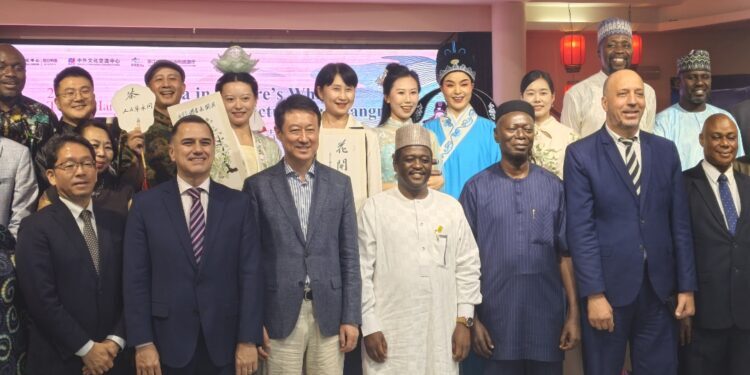In a celebration that blended history, heritage, and harmony, the Chinese Embassy in Nigeria hosted the 2025 edition of the “Tea for Harmony Yaji Cultural Salon” on Saturday in Abuja, underscoring tea’s role as a powerful symbol of cultural diplomacy.
Held at the Chinese Cultural Centre, the event — themed “Tea in Nature’s Whisper, Aroma of Picturesque Jiangnan” — brought together diplomats, cultural officials, lawmakers, and students to explore the shared values and traditions between China and Nigeria through tea culture.
The Chinese Ambassador to Nigeria, H.E. Yu Dunhai, reaffirmed his country’s commitment to deepening cultural and educational ties.
He stressed that the embassy would continue fostering exchanges across art, tourism, education, and the creative economy to boost mutual understanding.
“Chinese tea culture embodies the philosophical wisdom of five millennia,” said Ambassador Yu.
“The ethos of the tea ceremony — harmony, elegance, and balance — resonates deeply with Nigerian values of peace and community.”
He praised the growing cultural connections between the two nations, highlighting student exchanges, volunteer activities, and China’s support for Nigeria’s creative economy.
“From the ‘Ten-Thousand-Mile Tea Route’ to the ‘Digital Silk Road,’ culture remains the bond linking our peoples,” he added.
Nigeria, in turn, is embracing the tea economy. In 2024, Hainan Baisha tea entered the Nigerian market, paving the way for new trade and cultural collaborations.
“Tea has become a green envoy — a small leaf with the power to warm hearts and build bridges,” the envoy said.
“In Lagos or Kano, tea is not just a drink — it’s a way of life.”
The event also served as a platform to promote the ongoing China-Africa Cooperation Plan, with cultural exchange forming a cornerstone of the three-year partnership spanning 2025–2027.
Dr Muktar Muhammad, Permanent Secretary of Nigeria’s Federal Ministry of Art, Culture and the Creative Economy, highlighted the economic potential of tea.
“Our tea market is expanding. With creative branding and cultural festivals, we can tap into the global tea economy,” he said.
He praised the Chinese Cultural Centre for facilitating mutual learning and dialogue through exhibitions, performances, and workshops that promote shared humanity.
Chairman of the House Committee on Culture and Creative Economy, Hon. Saleh Zock, lauded China as a true friend to Nigeria.
“Today’s event has shown us the value of investing more in our own cultural identity,” he said.
For Ms. Olubunmi Olowookere of the Social Development Secretariat, tea is more than a beverage.
“It is a symbol of peace, reflection, and community. In its simplicity, we find profound wisdom,” she reflected.
Mrs Larai Nana Ahmed, representing the Ministry of Education, echoed similar sentiments.
She said tea had long served as a cultural bridge, highlighting the impact of Belt and Road initiatives and other Chinese-led exchange platforms.
As guests sipped tea and witnessed traditional performances, the aroma of Jiangnan’s heritage mingled with Nigeria’s vibrant culture — a reminder that even the quiet ritual of tea can speak volumes across continents.











